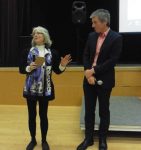Gyda Chud of Jewish Seniors Alliance with forum speaker Dan Levitt of Tabor Village. (photo by Binny Goldman)
On Sunday, Nov. 6, 175 people gathered at the Peretz Centre for Secular Jewish Culture for the Jewish Seniors Alliance of Greater Vancouver’s fall symposium, featuring Dan Levitt and his unique approach to residential living.
Ken Levitt, president of JSA, spoke briefly about the seniors organization, after which Gyda Chud, co-convener, greeted the crowd and introduced the Three Amigos, Yom Shamash, Ian St. Martin and Steve Glass, a musical trio who urged attendees to join in as they sang and played songs which included “Bei Mir Bistu Sheyn” – and Chud thanked the musicians with “bei undz bistu sheyn,” “in our eyes you are nice.”
Shanie Levin introduced Levitt.
“In continuing the theme of our Empowerment Series, ‘Thriving until 120,’ we have invited Dan Levitt, executive director of Tabor Village, an elder-care facility affiliated with Fraser Health Authority,” she said. “Levitt is also an adjunct professor in the gerontology department at Simon Fraser University, whose insights and leadership on seniors’ care are sought after in Canada, the U.S., Europe and Asia.”
Levitt challenges societal attitudes towards aging by introducing new approaches to residential living. The goal of his talk – Rethinking Aging: Not the Traditional Nursing Home Grandma Lives In – was to start a conversation that reframes elderhood as an exciting stage in human growth and development.
Levitt would like people to discard the stereotypes of aging that have been emphasized by the media. He wants people to remove the word “still” when praising someone who looks good at 75, to refrain from showing surprise at the ability of someone to work at 80, and for people to maintain high expectations as they age.
He cited an experiment in which each of the residents on the first floor of a seniors residence were given an African violet to water, while second-floor residents were told of a doll that was left in the care of the staff and that, together, they had to make sure it didn’t get lost. On follow up, it was discovered that those who were given the individual responsibility to care for the plants thrived, requiring less medication, and their moods were uplifted, whereas those with the collective responsibility did not fare as well.
Levitt said the idea of individual responsibility has been introduced at Tabor Village and the residents are flourishing, as they expect more of themselves and feel increased self-worth. Levitt mentioned one occasion, where a resident remembered her recipe for pancakes and proceeded to make pancakes from scratch for 20 diners. She then approached Levitt, saying: “You didn’t think I could do it, right?” He had to agree, as he looked around the spotless kitchen. She had not only cooked and served the food, she had cleaned up afterwards.
Statistics show that an average of nine medications are given to seniors in British Columbia. Some of these are chemical restraints – anti-psychotic medications – just to alter behavior and make the residents easier for staff to deal with.
One alternative method that has proven effective is music therapy, said Levitt. This therapy enables non-verbal residents to sing their thoughts when speech has failed.
Alive Inside is an experiment by Dan Cohen, which introduced iPods into a seniors home. Listening to the music, each with their own earphones, non-verbal residents experienced an unprecedented improvement. They readily responded to familiar music, singing along. Some were even able to hold a conversation afterward, saying the music gave them hope and happiness inside. Subsequently, a program called Music and Memory was instituted.
In addition, many residences have introduced computer classes, which benefit many residents.
Breaking old policies is indeed difficult but must be strived for, said Levitt. There are many books, videos and films on the subject of dementia and the stigma that is often associated with it. Still Alice and Glen Campbell: I’ll Be Me are two examples.
Levitt listed off some “super seniors”: one who had climbed Mount Kilimanjaro at age 90; another who golfed and had come close to beating the pros at age 90; and Olga Kotelko, who ran races, breaking records and winning medals into her 90s (she died in 2014).
There are many experimental and successful programs being carried out, said Levitt. One is Hogeweyk in Amsterdam, a village built and devoted to seniors with dementia. A small Ontario town, Penetanguishene, has recreated a village similar to Hogeweyk and relatives of the residents are reportedly pleased with how happy those living in this community are; residents are able to shop and walk to the market, for instance. In Florida, Miami Jewish Health Systems is seeking to create a similar program – Green House Project focuses on helping companies and individuals convert or build residential homes where every room would have a shower. These residences, which exist in several states in the United States, can provide a high level of care for those who do not wish to be in a nursing home.
Levitt ended his talk with a quote from Margaret Mead: “Never doubt that a small group of thoughtful, committed citizens can change the world. It is the only thing that ever has.”
Chud thanked Levitt for teaching the audience to think differently, and noted that the success of the event was made possible by the dedicated help of JSA’s office staff. A video taken by Karon and Stan Shear can be found at jsalliance.org.
Binny Goldman is a member of the Jewish Seniors Alliance of Greater Vancouver board.

